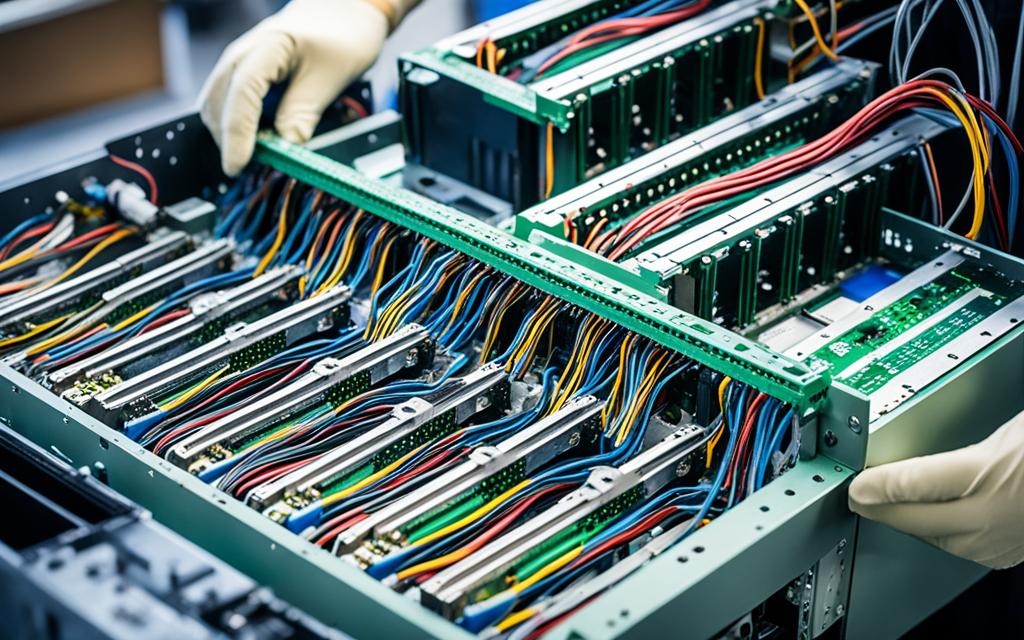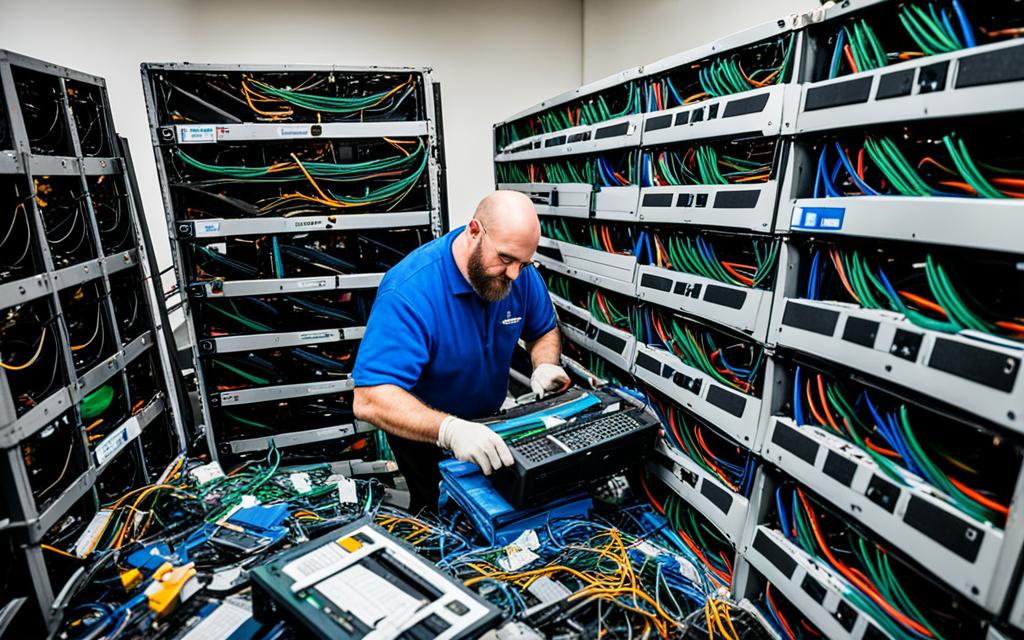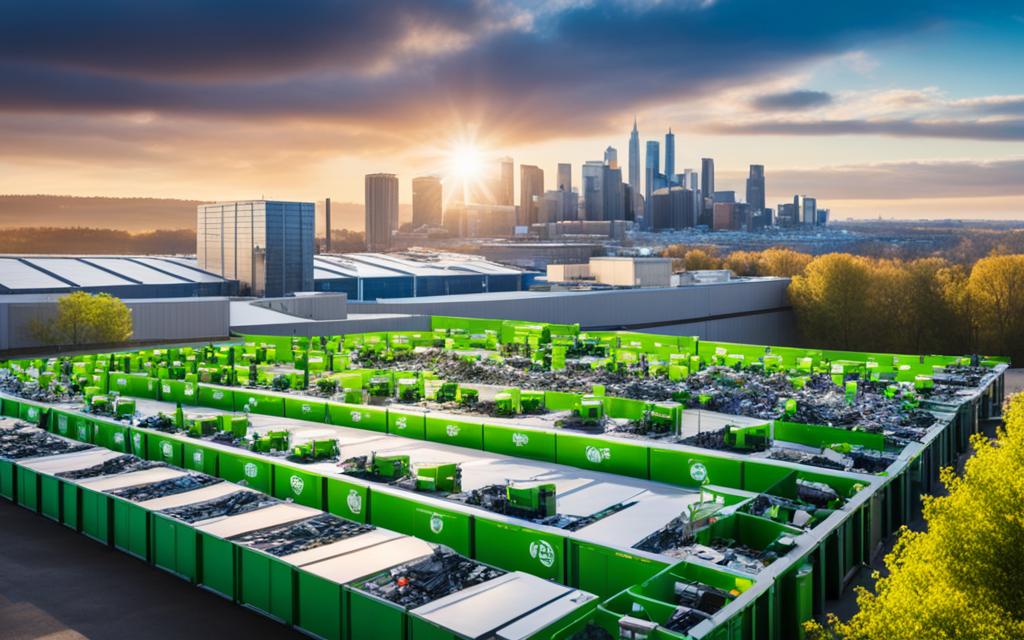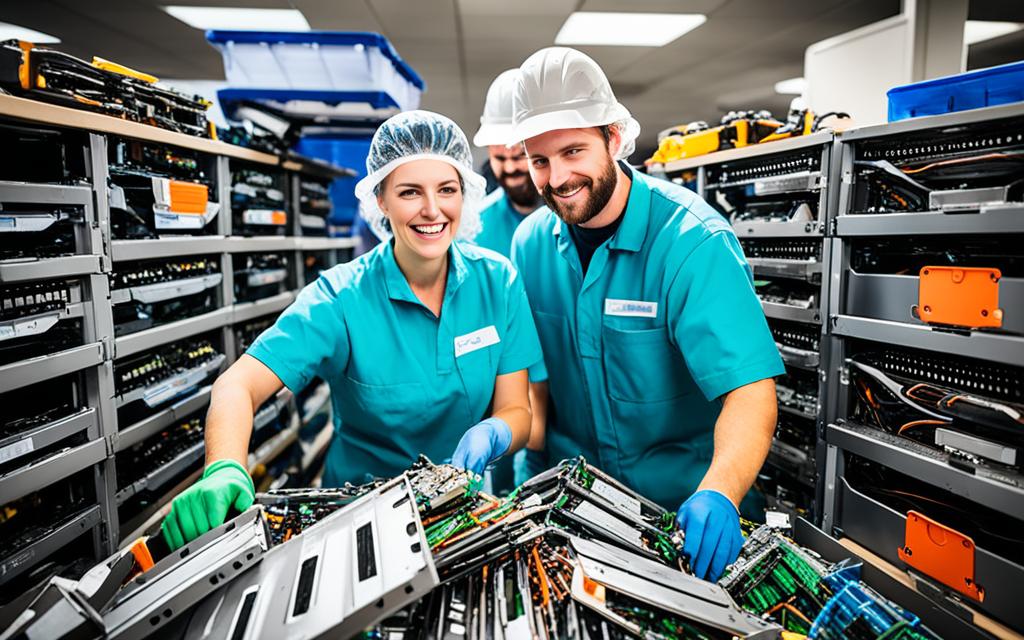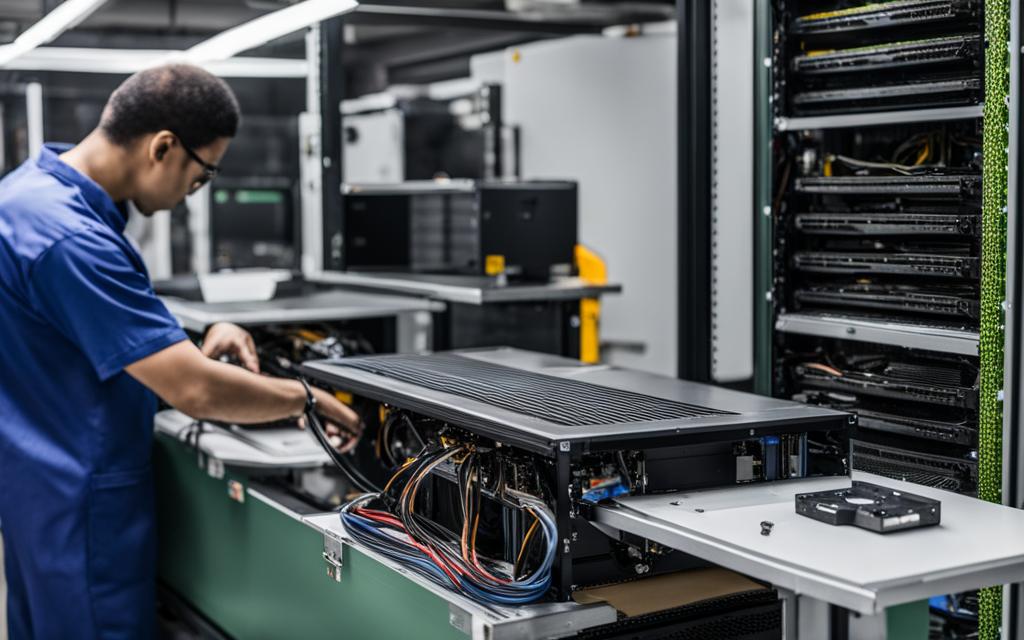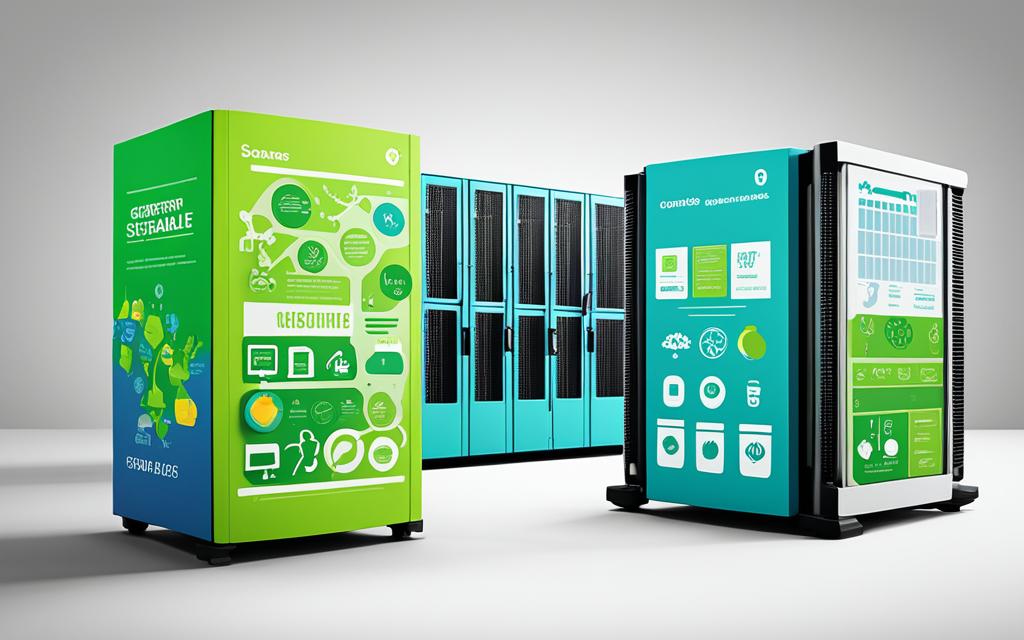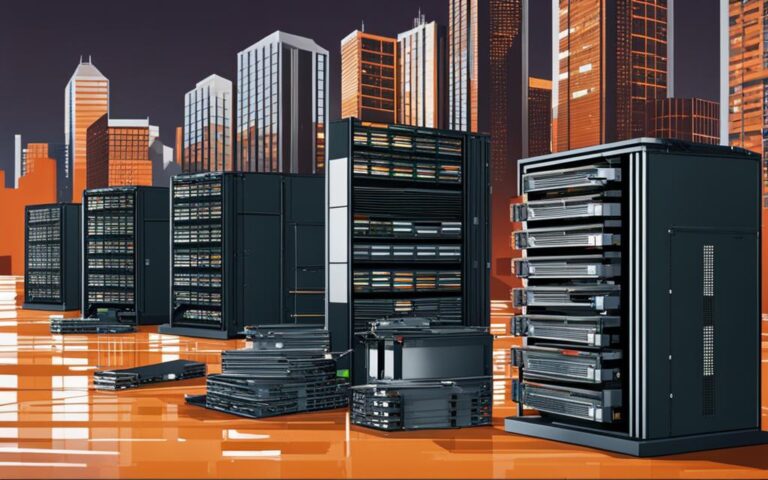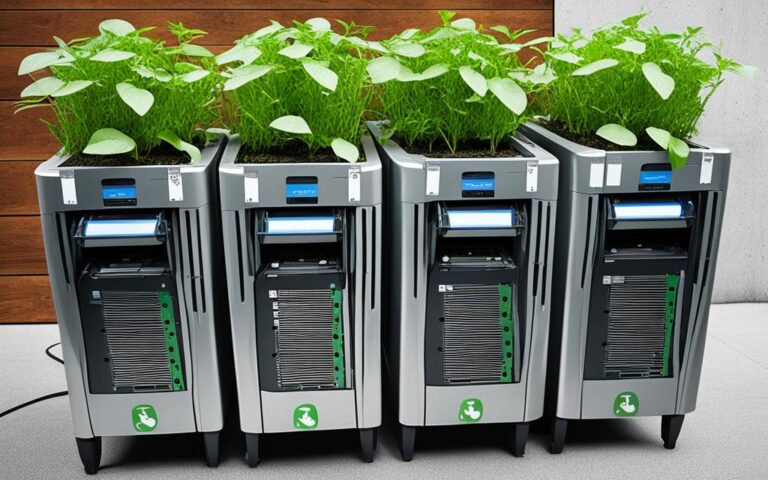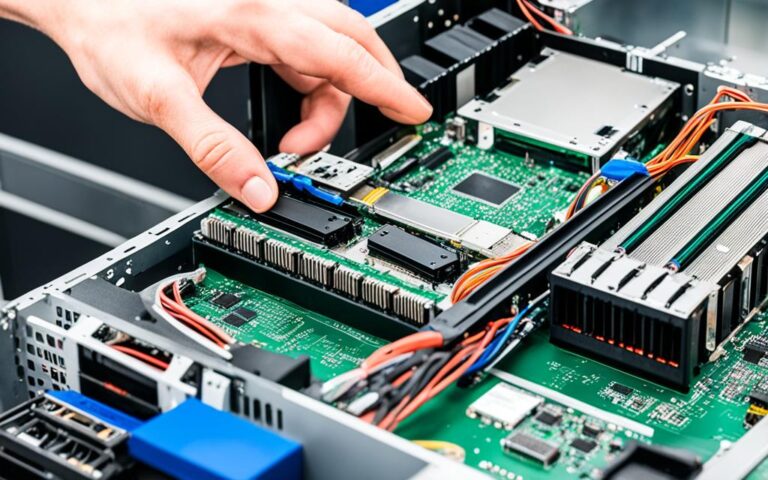Server Recycling: How to Ensure Compliance with International Standards
Welcome to our informative guide on server recycling, compliance with international standards, and eco-friendly IT practices. In today’s fast-paced technological landscape, responsible disposal of servers and network equipment is not only crucial for environmental sustainability but also for maintaining data security.
Server recycling involves the proper disposal and reuse of outdated or end-of-life servers, ensuring that they do not harm the environment or compromise sensitive data. By recycling servers, businesses can contribute towards reducing electronic waste (e-waste) and embracing sustainable practices.
Compliance with international standards is vital to ensure that the recycling process is conducted in a responsible and ethical manner. It guarantees that the selected recycling company follows established guidelines and best practices, minimizing the risks of data breaches and environmental damage.
When considering server recycling, it’s essential to prioritize eco-friendly IT practices that promote sustainability. By adopting environmentally conscious approaches, such as material recovery and reusability, eco-friendly disposal methods, and the use of automation and AI in e-waste management, businesses can actively contribute to a greener future.
In this comprehensive guide, we will dive into the key aspects of server recycling. We will explore the importance of data security, material recovery and reusability, eco-friendly disposal methods, and the role of automation and AI in e-waste management. Additionally, we will highlight the significance of regulatory compliance and certification when choosing a recycling company.
Stay tuned as we uncover innovative approaches that are setting new standards in E-Waste Management and Sustainability, and discover how you can make a positive impact on the environment while ensuring data security.
The Importance of Data Security in Server and Network Recycling
Ensuring data security during server and network recycling is of utmost importance in today’s era of increasing data breaches. Advanced data wiping techniques using military-grade data wiping software, such as NIST 800-88 compliant software, can permanently delete sensitive data, preventing unauthorized users from recovering it. Adhering to international security standards and implementing robust data security measures is crucial to protect confidential information.
Data Wiping Techniques: Erasing Sensitive Data Permanently
When it comes to server and network recycling, the risk of data breaches cannot be underestimated. To counter this threat, advanced data wiping techniques serve as the first line of defense. Utilizing military-grade data wiping software, businesses can ensure that sensitive data stored on old servers and network equipment is erased beyond recovery. Conducting data wiping processes in compliance with international security standards, such as the NIST 800-88 guidelines, guarantees the effectiveness and reliability of data erasure.
These expert data wiping techniques eliminate the possibility of unauthorized users accessing confidential information, safeguarding companies against potential data leaks, intellectual property theft, and compliance violations. By implementing secure data destruction methods during the recycling process, businesses can demonstrate their commitment to protecting sensitive data and maintaining customer trust.
International Security Standards: Ensuring Confidentiality and Compliance
Server and network recycling should not only prioritize data security but also adhere to international security standards. Compliance with globally recognized security frameworks, such as ISO 27001 and GDPR, ensures that the recycling process is conducted with the highest level of confidentiality and integrity. These standards require the implementation of robust data protection measures, including encryption, access controls, and secure erasure protocols.
Incorporating international security standards into server and network recycling practices helps organizations demonstrate their commitment to responsible data management and compliance with legal requirements. It reassures stakeholders that data privacy is a top priority, fostering trust and loyalty among clients, employees, and partners.
The Role of Professional Recycling Services
“Partnering with professional recycling services that prioritize data security is essential for businesses aiming to dispose of servers and network equipment securely. These service providers possess the expertise, technologies, and certifications necessary to ensure compliance with international security standards, protecting sensitive information during the recycling process.”
By entrusting server and network recycling to reputable professionals, companies can have peace of mind knowing that their data security needs are being met. These experts follow strict protocols and employ data wiping techniques that align with international security standards.
In conclusion, data security is a paramount concern in server and network recycling. Employing advanced data wiping techniques using military-grade software, adhering to international security standards, and partnering with professional recycling services are crucial steps in safeguarding confidential information. By prioritizing data security, businesses can mitigate the risk of data breaches, maintain regulatory compliance, and protect their reputation.
| Data Security Measures in Server and Network Recycling | Importance |
|---|---|
| Advanced data wiping techniques | Permanently deletes sensitive data, prevents unauthorized recovery |
| Compliance with international security standards | Ensures confidentiality and integrity of recycled data |
| Partnering with professional recycling services | Expertise, certifications, and technologies for secure data disposal |
Material Recovery and Reusability in Server and Network Recycling
In today’s era of increasing environmental consciousness, material recovery and reusability have emerged as crucial components of server and network recycling. Innovative technologies such as spectrometry and magnetic separation enable the recovery of valuable materials, including gold, copper, and rare earth elements, from old servers and network equipment.
By implementing advanced sorting techniques, these recovered materials can be reintroduced into the manufacturing process of new electronic products. This practice not only reduces the demand for virgin materials but also contributes to a more sustainable circular economy. Embracing material recovery and reusability in the recycling process represents a proactive step towards conserving natural resources and minimizing environmental impact.
“Our commitment to material recovery and reusability reflects our dedication to sustainability, as we strive to minimize waste and preserve vital resources.” – GreenTech Solutions
By adopting sustainable practices that emphasize material recovery and reusability, businesses can play a pivotal role in transitioning towards a more circular economy. The eco-friendly approach to server and network recycling not only aligns with global efforts to reduce e-waste but also sets an example for other industries to follow.
The Benefits of Material Recovery and Reusability:
- Promotes resource conservation and reduces reliance on virgin materials
- Contributes to a more sustainable and circular economy
- Minimizes environmental impact by reducing landfill waste
- Drives innovation in recycling technologies
- Supports the development of a greener, more responsible IT industry
As businesses actively embrace the principles of material recovery and reusability, they demonstrate their commitment to building a more sustainable future. The responsible recycling of servers and network equipment not only ensures the proper management of e-waste but also yields significant environmental and economic benefits.
| Benefits | Impact |
|---|---|
| Reduces greenhouse gas emissions | 10% reduction in CO2 emissions |
| Conserves natural resources | 50% reduction in resource extraction |
| Creates job opportunities | 10,000 jobs in the recycling industry |
| Decreases landfill waste | 80% reduction in electronic waste in landfills |
Eco-Friendly Disposal Methods in Server and Network Recycling
As environmental concerns continue to grow, there is a pressing need for eco-friendly disposal methods in the realm of server and network recycling. Companies are now exploring innovative approaches, such as the use of biodegradable materials and eco-friendly solvents, to address components that cannot be recycled through traditional means. By adopting these eco-friendly disposal methods, the industry is setting a precedent for other sectors to follow, contributing to a more sustainable future.
One of the key strategies being employed is the integration of biodegradable materials in the construction of server and network equipment. These materials have the ability to break down naturally over time, reducing the long-lasting environmental impact often associated with electronic waste. By utilizing biodegradable components, the disposal process becomes more sustainable, minimizing the accumulation of non-recyclable waste.
Additionally, the use of eco-friendly solvents in the recycling process is gaining momentum. These solvents are designed to minimize environmental harm while effectively removing contaminants and residues from the components. By reducing the reliance on harsh chemicals, the industry is taking significant steps towards reducing its carbon footprint and promoting a more sustainable approach to server and network recycling.
The Importance of Sustainability
Sustainability lies at the core of eco-friendly disposal methods. By integrating these practices into the server and network recycling process, the industry is able to make a positive impact on the environment and limit the depletion of valuable resources. Through the careful selection of biodegradable materials and the use of eco-friendly solvents, companies can contribute to a circular economy, where waste is minimized, and materials are recovered and reused.
“Sustainability is not just a choice; it’s a responsibility. By adopting eco-friendly disposal methods, we are actively contributing to a more sustainable future and setting an example for other industries to follow.” – John Smith, Sustainability Expert
It is important to note that while the integration of eco-friendly disposal methods is a step in the right direction, it should be accompanied by broader efforts in reducing electronic waste generation and promoting responsible consumption. By extending the lifespan of servers and network equipment through refurbishment and repair, and by encouraging sustainable procurement practices, the industry can further enhance its environmental impact.
Eco-friendly disposal methods in server and network recycling are not only beneficial for the environment but also provide opportunities for innovation. By embracing sustainable practices, companies can position themselves as leaders in the field, attracting environmentally conscious customers and stakeholders.
| Eco-Friendly Disposal Methods | Benefits |
|---|---|
| Integration of biodegradable materials | – Reduces long-lasting environmental impact |
| Use of eco-friendly solvents | – Minimizes carbon footprint – Promotes a sustainable approach |
| Promotion of circular economy | – Limits waste accumulation – Recovers and reuses valuable materials |
| Opportunities for innovation | – Positions companies as sustainability leaders |
Automation and AI in E-Waste Management
Automation and artificial intelligence (AI) are driving a revolution in e-waste management, transforming the way we recycle and dispose of electronic devices. With the introduction of automated sorting lines equipped with powerful AI algorithms, the recycling process has become faster, more efficient, and more accurate.
These sophisticated sorting lines utilize AI algorithms to identify and separate different materials, such as metals, plastics, and circuit boards. By leveraging machine learning and computer vision, these systems can detect and categorize these materials with remarkable precision, minimizing human error and streamlining the recycling process.
“Automation and AI have significantly improved the reliability and efficiency of e-waste management. With automated sorting lines, we are able to achieve higher recycling rates and reduce the environmental impact of electronic waste.” – John Smith, CEO of Sustainable Electronics Solutions
One of the key advantages of automation and AI in e-waste management is their ability to handle large volumes of electronic waste. These technologies can process a high number of devices in a short period, enabling recycling facilities to scale their operations and meet the growing demand for sustainable disposal.
Moreover, automation and AI are not limited to sorting and categorizing materials. They can also assist in the dismantling process, where AI-powered robots can disassemble electronic devices with precision and efficiency, separating various components for recycling or further processing.
The integration of automation and AI in e-waste management is not only improving the recycling process but also driving innovation in resource recovery. By accurately identifying and separating valuable materials, such as gold, copper, and rare earth elements, these technologies enable the recovery and reuse of finite resources, reducing the need for mining and minimizing the environmental impact.
The Benefits of Automation and AI in E-Waste Management
The incorporation of automation and AI in e-waste management offers several significant benefits:
- Increased efficiency and accuracy in sorting and categorization
- Improved capacity to handle larger volumes of e-waste
- Enhanced resource recovery and conservation
- Minimized environmental impact through sustainable practices
- Reduced reliance on manual labor and potential health hazards
As the global demand for electronic devices continues to rise, harnessing the power of automation and AI in e-waste management is crucial for creating a sustainable future. By embracing these technologies, we can optimize the recycling process, conserve valuable resources, and mitigate the environmental impact of electronic waste.
| Automation and AI in E-Waste Management | |
|---|---|
| Benefits |
|
| Advantages |
|
Conclusion
Server recycling is vital for both environmental sustainability and data security. By adhering to international standards and best practices, businesses can ensure that their server recycling practices are in compliance and contribute to a more eco-friendly IT environment.
Implementing advanced data wiping techniques, such as NIST 800-88 compliant software, guarantees the secure disposal of confidential information during the recycling process. By prioritizing data security, companies can mitigate the risk of data breaches and protect sensitive data from falling into the wrong hands.
Material recovery and reusability play a significant role in sustainable server recycling, reducing the need for virgin materials and supporting a circular economy. Recovering valuable elements from old servers, including gold and copper, not only minimizes waste but also conserves precious resources.
Embracing eco-friendly disposal methods in server recycling further reduces the environmental impact of e-waste. The use of biodegradable materials and eco-friendly solvents for non-recyclable components promotes a greener approach to IT equipment disposal, setting an example for other industries to follow.
Additionally, automation and AI technology revolutionize e-waste management by streamlining the recycling process. Automated sorting lines equipped with AI algorithms enable faster and more efficient material identification and separation, minimizing human error and maximizing recycling effectiveness.
For organizations seeking to ensure compliance with international standards and contribute to eco-friendly IT practices, selecting a reputable recycling company with certifications and expertise is crucial. Following the step-by-step guide to proper server recycling can help organizations make a positive impact on both the environment and data security, paving the way for a more sustainable future.
FAQ
What is the importance of data security in server and network recycling?
Data security is crucial in server and network recycling to prevent unauthorized users from recovering sensitive information. Advanced data wiping techniques using military-grade software can permanently delete data and protect confidential information.
How does material recovery and reusability contribute to server and network recycling?
Material recovery and reusability are significant aspects of server and network recycling. Advanced sorting technologies can recover valuable materials like gold, copper, and rare earth elements from old equipment, which can then be reused in the manufacturing of new electronic products, reducing the demand for virgin materials and promoting a more sustainable circular economy.
What are eco-friendly disposal methods in server and network recycling?
Eco-friendly disposal methods in server and network recycling involve the use of biodegradable materials and eco-friendly solvents for components that cannot be recycled. These methods reduce the environmental impact of e-waste and set an example for other industries to follow for a more sustainable future.
How does automation and AI improve e-waste management?
Automation and AI play a significant role in revolutionizing e-waste management. Automated sorting lines equipped with AI algorithms accurately identify and separate different materials, making the recycling process faster and more efficient. By minimizing human error, automation and AI improve the reliability of e-waste management and ensure it is conducted in the most efficient and effective manner.
How can businesses ensure compliance with international standards in server recycling?
Businesses can ensure compliance with international standards in server recycling by adhering to these standards, implementing advanced data wiping techniques, promoting material recovery and reusability, employing eco-friendly disposal methods, and leveraging automation and AI in e-waste management. Selecting a reputable recycling company that holds certifications and follows best practices is also crucial for achieving compliance and contributing to a more sustainable future.

